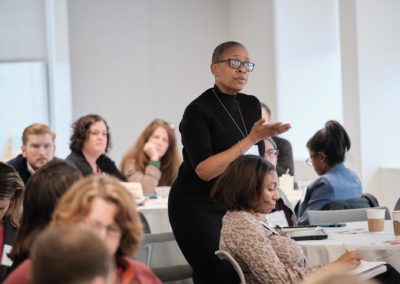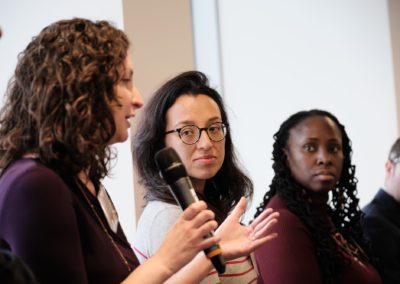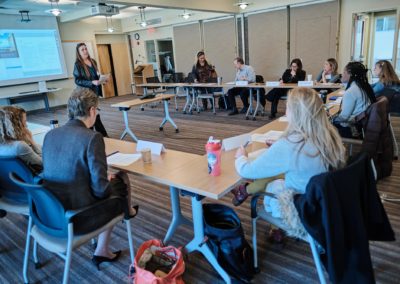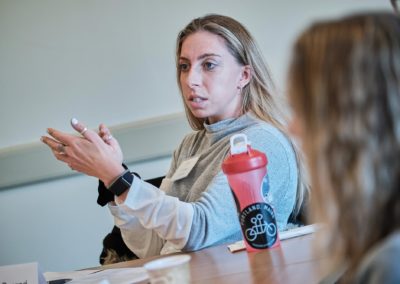RIZE MASSACHUSETTS
2020
ANNUAL
REPORT
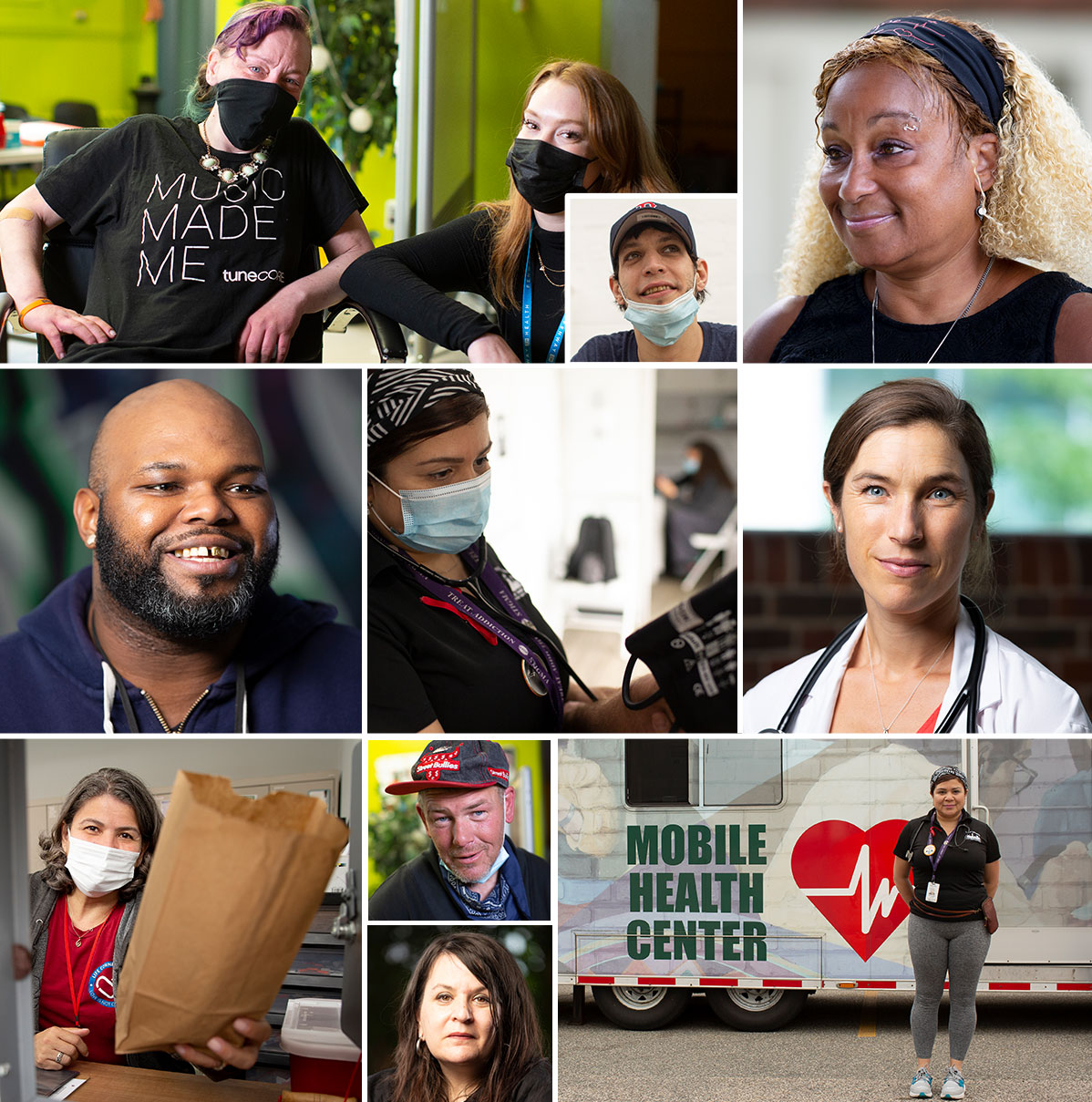
Letter from our President and Board Chair
Dear Friends,
In the year 2020, we all faced unforeseen, unparalleled challenges. For individuals living with substance use disorders, however, the pandemic has been especially devastating. Massachusetts experienced a five percent increase in opioid related deaths, erasing gains made in the last five years. Our hearts break at the death toll not only from COVID-19 but also from opioid use disorder.
For those we serve at RIZE Massachusetts Foundation, this epidemic within a pandemic increased isolation and prompted a pronounced reduction in access to critical care and treatment. Measures intended to keep us safe from COVID proved detrimental for those at risk for overdose: medical guidance underscored the importance of social distancing; overwhelmed emergency rooms filled to capacity; every healthcare resource was pushed to the brink; and decreased access to substance use treatment services made an already arduous process insurmountable for many.
As demonstrated in our annual report, the challenges presented in 2020 allowed us to reimagine our mission to meet the needs of the organizations, advocates, and individuals we supported during the pandemic. Our priorities mirror the world around us and are clearly reflected in our planning and programming.
The urgency and importance of RIZE’s mission has never been greater. We invite you to learn about our work and the people and organizations who make it possible. Thank you for your support.
[widget id=”divi_pb_widget-5″]
2020 AT-A-GLANCE
an epidemic within a pandemic
COVID-19 exacerbated the overdose crisis. People with addiction — already stigmatized and underserved by the healthcare system — faced even greater barriers to treatment and tremendous risk as the system was pushed to capacity by the pandemic and critical services were severely curtailed.
2,104
fatal overdoses in 2020
5%
increase over 2019
34%
of people with substance use disorder surveyed reported changes or disruptions in accessing treatment or support services since the onset of COVID-19
our impact
$2.5m
raised in 2020
$2.6m
in grants
56
COVID rapid-response grants
85
organizations funded in 2020
press coverage
View From The Field: Dr. Miriam Komaromy On COVID Care At Boston Medical Center
by Miriam Komaromy, MD
December 14, 2020
‘A perfect storm’: Pandemic is making it harder to kick drugs
Patriot Ledger
October 27, 2020
RIZE develops a program to combat racism and opioid addiction
El Planeta
October 20, 2020
Pandemic hasn’t erased the opioid epidemic
CommonWealth
October 9, 2020
Sounding the alarm: Seeing warning signs of an epidemic within the COVID pandemic (Viewpoint)
MassLive
August 30, 2020
Opioid crisis must not be forgotten (Editorial)
The Republican Editorials
June 12, 2020
Learning From COVID-19: Catalyzing Change To Address The Overdose Crisis
by Dr. Sarah Wakeman
June 10, 2020
The opioid epidemic: A complex social crisis requires a multi-pronged solution
The Salem News
February 20, 2020
We can’t look away. It’s so easy to look away, but people will get sicker and sicker. There will be more people on the streets, people will lose their homes and, obviously, the biggest danger is death. People can die quickly from this, and we can’t lose sight of them.
President & CEO, RIZE Massachusetts
2020
Grantees
- AHOPE – Boston Public Health Commisssion
- AIDS Support Group of Cape Cod
- Bay Cove Human Services, Inc.
- Boston Health Care for the Homeless Program
- Boston Medical Center – Grayken Center for Addiction Medicine
- Boston Public Health Commission
- Brandeis University
- Bridge Over Troubled Waters, Inc.
- Brockton Neighborhood Health Center
- Cambridge Health Alliance
- Casa Esperanza, Inc.
- Cathedral Church of St. Paul
- City of Everett
- City of Malden Health Department
- City of Medford
- Codman Square Health Center
- Community Action Programs Inter-City, Inc.
- Community Healthlink, Inc.
- Ecclesia Ministries, Inc.
- Fenway Health
- Fishing Partnership Support Services
- Gavin Foundation
- Granada House
- Greater Lawrence Family Health Center
- Haley House, Inc.
- Health Resources in Action
- Hope House, Inc.
- Institute for Community Health
- Interim House
- Kraft Center for Community Health
- Learn to Cope, Inc.
- Life Connection Center
- Lynn Community Health Center
- Massachusetts Organization for Addiction Recovery
- Metropolitan Area Planning Council
- Middlesex Human Service Agency
- Multicultural AIDS Coalition, Inc./Women Connecting Affecting Change
- New England Culinary Arts Training
- New England Users’ Union
- North Suffolk-Meridian House
- Ostiguy High School
- HRH413
- Phoenix House
- Police Assisted Addiction and Recovery Initiative
- Prisoners’ Legal Services of Massachusetts
- Rehabilitation and Health, Inc.
- Rhode Island Hospital
- Rosie’s Place
- St. Francis House
- The Dimock Center
- The Paulist Center
- The Phoenix
- The Resource and Reclamation Center
- Tufts University School of Medicine
- Victory Programs, Inc.
- Volunteers of America
- Women’s Lunch Place
2020
Grantees
- AHOPE – Boston Public Health Commisssion
- AIDS Support Group of Cape Cod
- Bay Cove Human Services, Inc.
- Boston Health Care for the Homeless Program
- Boston Medical Center – Grayken Center for Addiction Medicine
- Boston Public Health Commission
- Brandeis University
- Bridge Over Troubled Waters, Inc.
- Brockton Neighborhood Health Center
- Cambridge Health Alliance
- Casa Esperanza, Inc.
- Cathedral Church of St. Paul
- City of Everett
- City of Malden Health Department
- City of Medford
- Codman Square Health Center
- Community Action Programs Inter-City, Inc.
- Community Healthlink, Inc.
- Ecclesia Ministries, Inc.
- Fenway Health
- Fishing Partnership Support Services
- Gavin Foundation
- Granada House
- Greater Lawrence Family Health Center
- Haley House, Inc.
- Health Resources in Action
- Hope House, Inc.
- Institute for Community Health
- Interim House
- Kraft Center for Community Health
- Learn to Cope, Inc.
- Life Connection Center
- Lynn Community Health Center
- Massachusetts Organization for Addiction Recovery
- Metropolitan Area Planning Council
- Middlesex Human Service Agency
- Multicultural AIDS Coalition, Inc./Women Connecting Affecting Change
- New England Culinary Arts Training
- New England Users’ Union
- North Suffolk-Meridian House
- Ostiguy High School
- HRH413
- Phoenix House
- Police Assisted Addiction and Recovery Initiative
- Prisoners’ Legal Services of Massachusetts
- Rehabilitation and Health, Inc.
- Rhode Island Hospital
- Rosie’s Place
- St. Francis House
- The Dimock Center
- The Paulist Center
- The Phoenix
- The Resource and Reclamation Center
- Tufts University School of Medicine
- Victory Programs, Inc.
- Volunteers of America
- Women’s Lunch Place
OUR WORK
RIZE meets the moment
RIZE acted as a financial safety net for our partners as they reexamined and redeployed their models while ensuring the well-being of their staff and clients. At the same time, we sought to address an even more daunting challenge: creating an equitable and just system of care for diverse individuals who struggle with opioid use through our new Innovations in Anti-Racism in Addiction Treatment grant program.
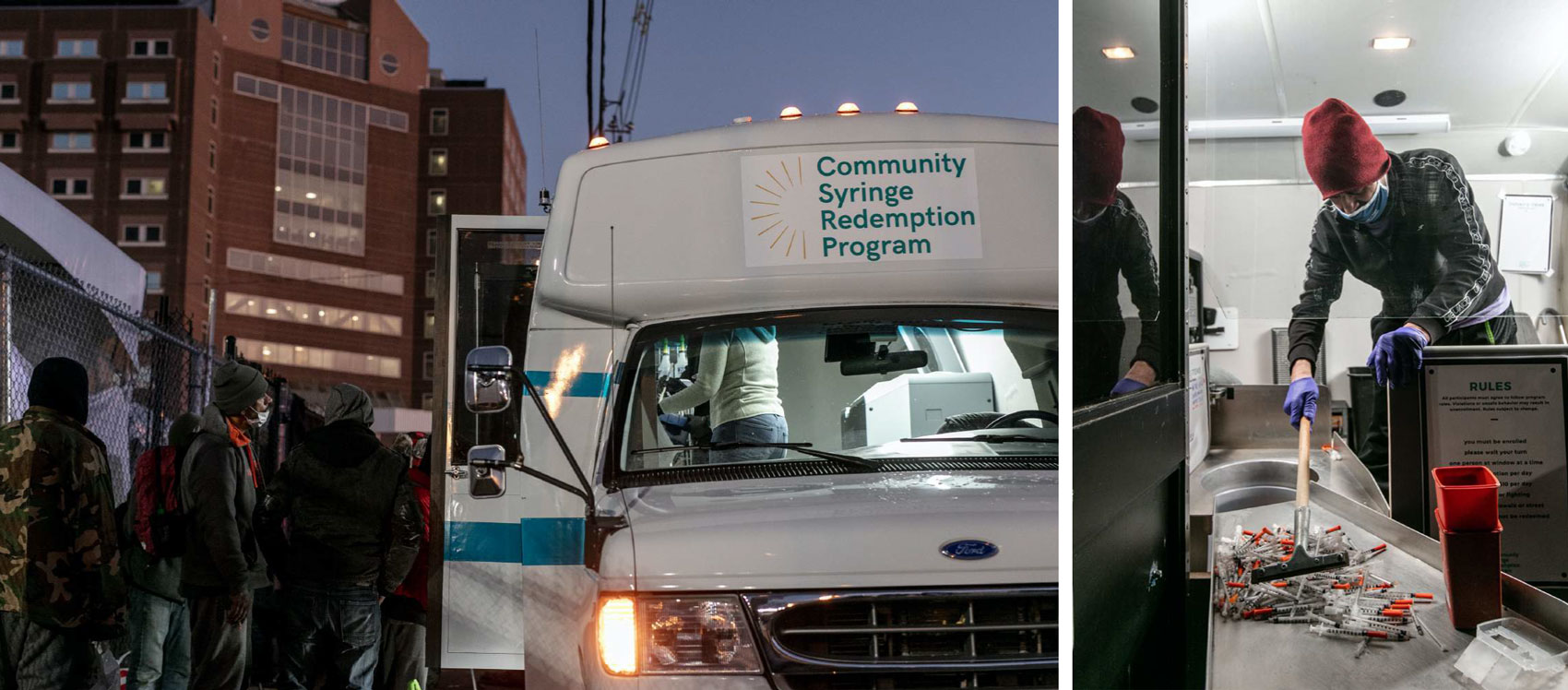
Photos by Wayne Chinnock Photography
the power of partnership
With the COVID-19 shutdown looming, RIZE collaborated with our community partners to identify their most immediate, pressing challenges and stepped forward with emergency financial relief. Together, we brought awareness and urgency to the devastating impact of the “epidemic within a pandemic” and made sure those with addiction were not left out of recovery efforts.
In March, RIZE provided 25 of our community partners across the Commonwealth with rapid response grants to help support — and show gratitude for — our colleagues providing care to our most vulnerable populations under extremely challenging circumstances. Starting in April, together with the Boston Resiliency Fund, we awarded grants to local residential treatment providers so that they could support their staff, purchase IT infrastructure for telehealth services, and increase sanitation measures.
Our rapid response funding continued throughout 2020 and evolved to include emergency shelters and day and overnight programs, thereby supporting a shared mission of building community and helping people meet their most basic needs.
RIZE’s generous support helped us through a challenging year of COVID-19, and they were there for us when we announced our plan to open the Victory Connector, a space for day respite, basic needs, and navigation to services specifically designed to serve the homeless, street-based populations struggling with substance use in the Mass/Cass area of Boston. We are grateful for their foresight and insight, and we trust and rely on RIZE to lead our state in the right direction when it comes to addressing the opioid epidemic.
Executive Director, Victory Programs
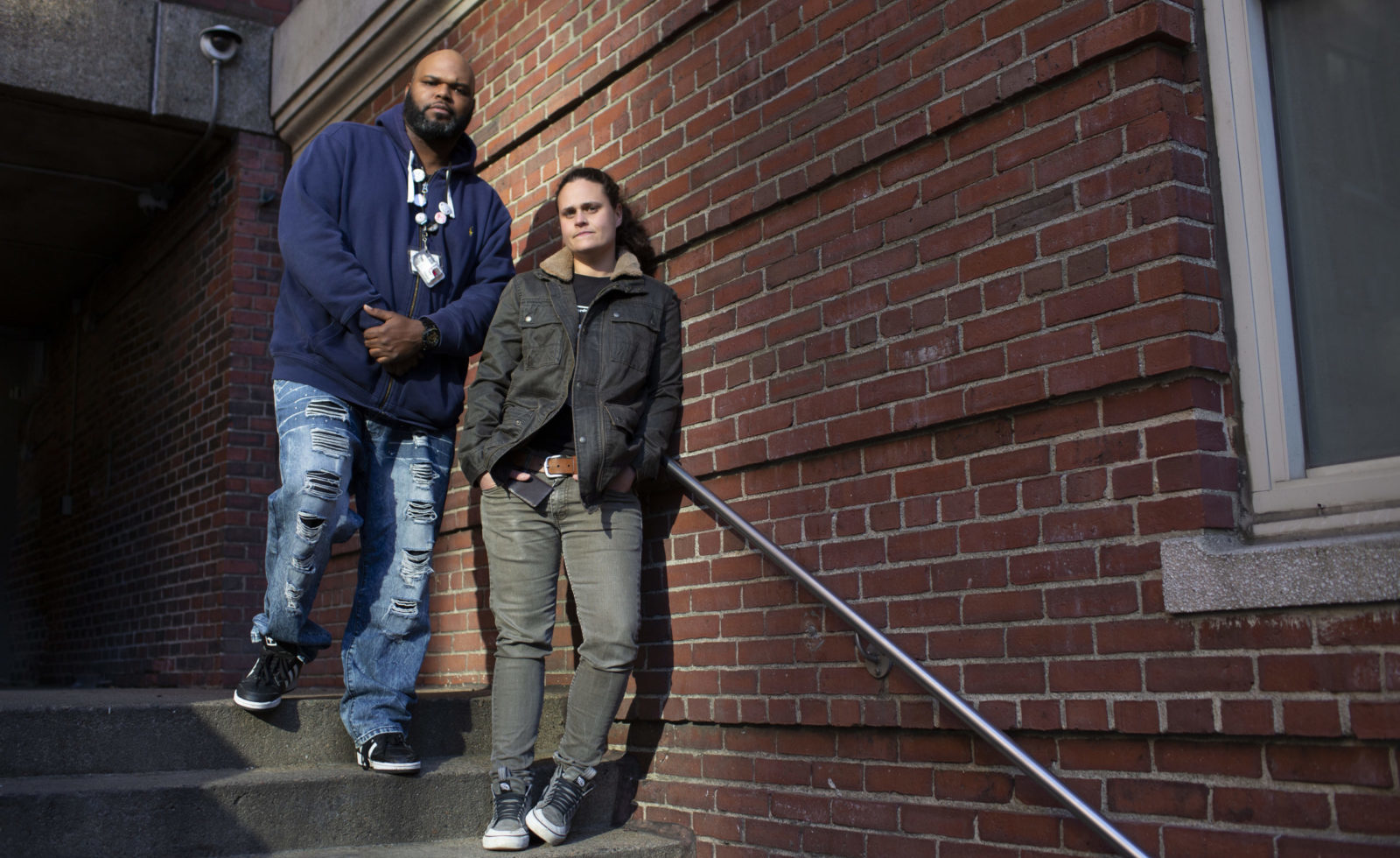
Kenneth Washington and Sarah Makin at AHOPE
Fighting Inequities in Addiction Treatment
As a nation, we have a responsibility to build an anti-racist public health response to the overdose crisis. RIZE has already started. Racism has led to disproportionate punishment, criminalization, and limited access to effective treatment for Black, Indigenous, and people of color (BIPOC) who use opioids. Structural racism has driven these punitive approaches and resulted in societal responses to drug use in BIPOC communities that rely heavily on the criminal legal system. Inequitable access to health care also extends to lifesaving medication treatment, such as methadone, buprenorphine, and naltrexone.
RIZE launched Innovations in Anti-Racism to Address the Overdose Crisis in July 2020. The vision was to create meaningful results in fighting racism and improving access to evidence-based addiction treatment by reducing the stigma and structural barriers faced by BIPOC. The grantees, receiving nearly $800,000 in total, are AHOPE/Boston Public Health Commission, Casa Esperanza, Codman Square Health Center, and Prisoners’ Legal Services.
In 2020, the confirmed opioid-related overdose death rate increased the most among Black non-Hispanic males — a staggering 69% jump over 2019.
Medical Director of the Substance Use Disorders Initiative, Program Director of the Addiction Medicine Fellowship at Massachusetts General Hospital, and RIZE Chief Medical Officer (2017-2020)
Building Coalitions to Reach Consensus
In 2019, RIZE launched Together in Recovery: Supporting Informed Decisions (TiR) to address the philosophical divides that arise in addiction treatment. The goal of this ongoing program is to foster an accessible, integrated treatment and recovery community in Massachusetts that champions evidence-based approaches, supports multiple pathways of recovery, and puts people in charge of their treatment choices. We knew that the only way to make this project a success was to bring together stakeholders from a range of backgrounds, approaches, and perspectives.
During the first phase (April 2019-June 2020), RIZE held convenings across the Commonwealth and took the data gathered to finalize a Statement of Principles and Priorities for Action document that embraces a unified vision representing varied perspectives of treatment.
In 2020, a TiR advisory committee led the creation of RIZE’s Your Rights in Recovery Toolkit, a resource providing information about recovery pathways, family resources, housing, education, employment, and the criminal legal system. It also informs the reader about the roles discrimination and racism play in gaining access to services.
→
Because of Together in Recovery, I learned how important it is to recognize that the path to recovery is very unique not just to an individual but also to each provider and organization. We just need to look at all of the different ways that a person can recover.
Director of Advancement and Communications, Casa Esperanza
Exploring the Post-Pandemic Addiction Treatment Landscape
An additional year of funding helped us evaluate and learn about the experiences of those seeking, receiving, and administering addiction treatment during a pandemic and what the “new normal” might look like.
Two of our signature grant programs, Saving Lives, Improving Health: Redesigning Opioid Use Disorder Care and Enabling Health: Enhancing Harm Reduction Services in Massachusetts, were due to end in 2020. But the COVID-19 pandemic brought unprecedented challenges to our grantees, requiring them to rapidly adapt and retool their programs. They had to replace many in-person services with telehealth and identify new processes to reach patients and support them to remain engaged in their care. In addition, they expanded their services to provide COVID-19 testing, administer vaccinations, and other supports. It was an easy choice to extend funding for these frontline organizations so that they could focus on their work, navigate the crisis, and plan for normalizing their operations beyond the crisis.
Using Data to Save Lives
The additional funding provided resources to continue the work started in Saving Lives and adapt programs and services to the COVID-19 context. Evaluation findings show that although the combined OUD patient panel decreased during the pandemic, the number of patients in care at the end of the grant was still 10% higher than the baseline. Despite COVID related challenges, the grantees were all able to continue to engage marginalized and vulnerable community members, including many people with mental illnesses and/or unstable housing status.
2020 Saving Lives Grantees
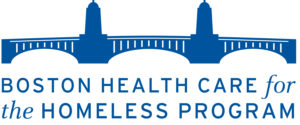
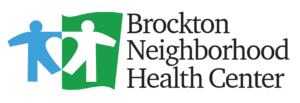
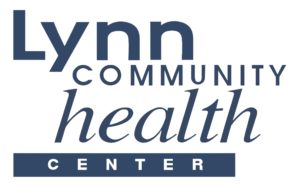
Identifying Future Best Practices to Enhance Harm Reduction
Important innovations in Enabling Health are yielding potential future best practices in the field of addiction treatment. This includes the integration of drug checking and mobile buprenorphine induction, as well as strong clinical partnerships that are being formed to facilitate warm handoffs for medication engagement. In 2020, the grantees became even more innovative to address immediate needs and navigate restrictions posed by COVID-19. These include the use of telehealth for buprenorphine induction, the creation of outdoor facilities to provide continued service without interruption, and enhanced street outreach protocols.
Learn more about our Enabling Health: Enhancing Harm Reduction grantees in this video.
2020 Enabling Health Grantees
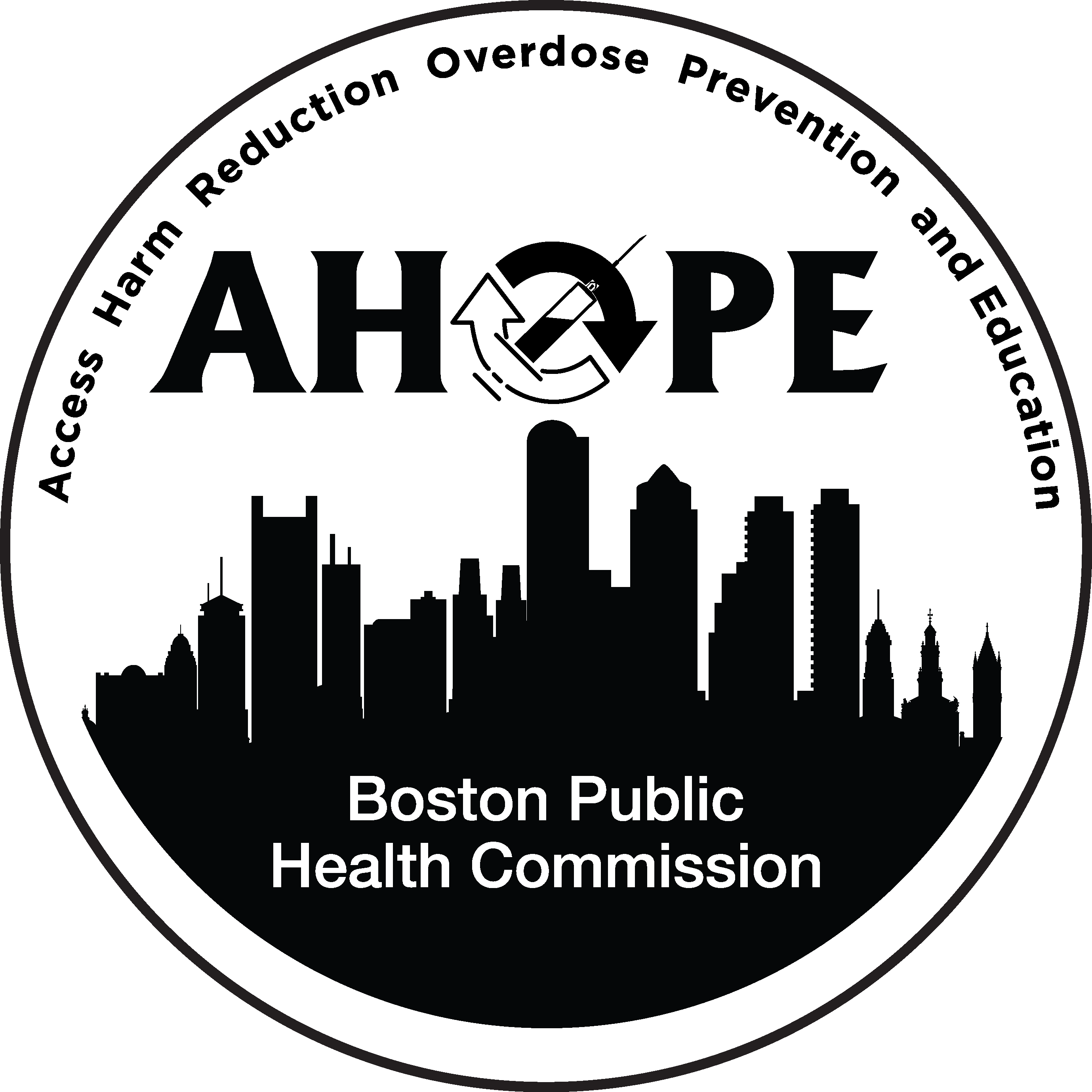
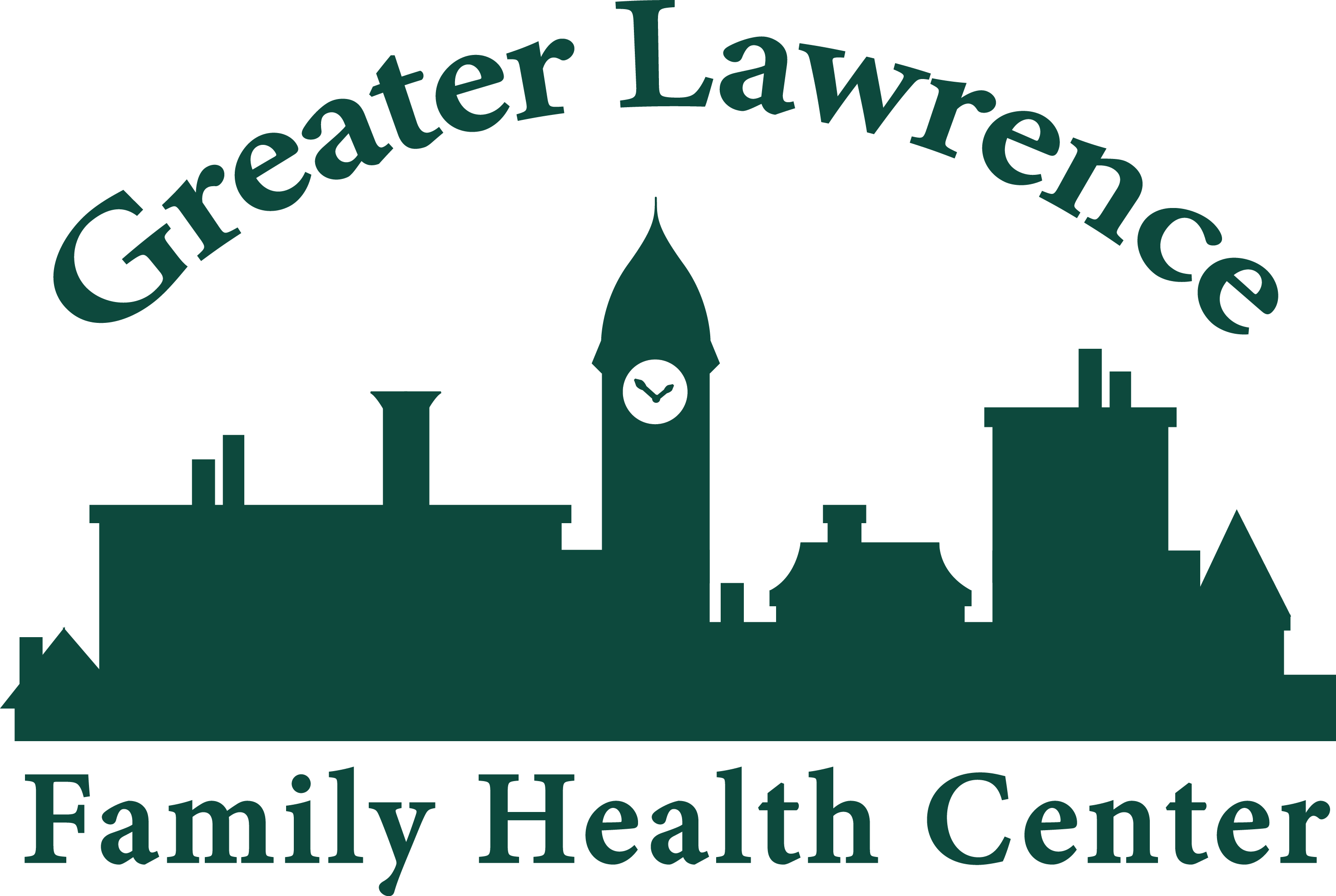

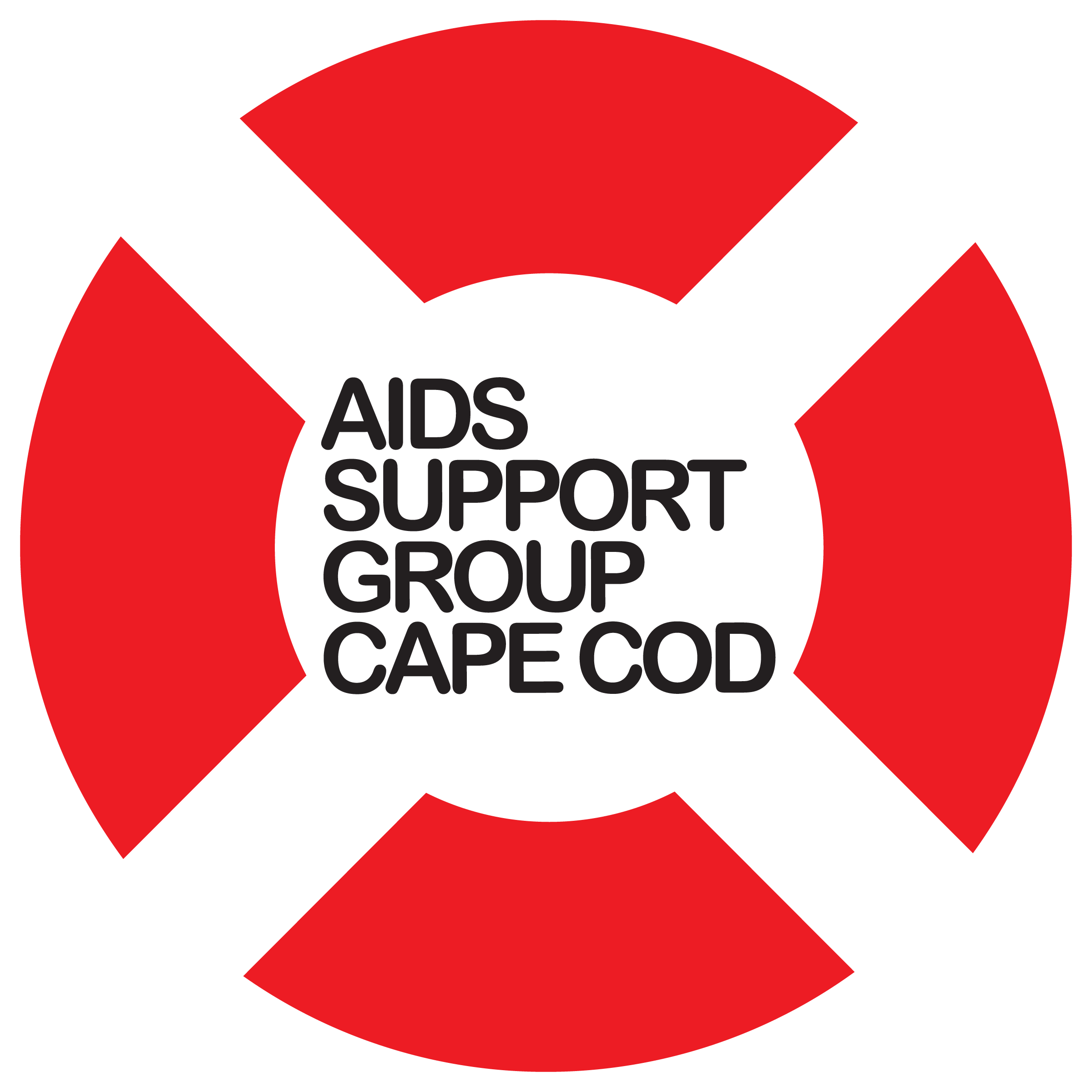
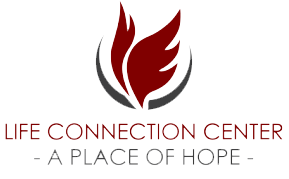
2020 donors
- Amazon Smiles
- Kevin Aries
- Debbi and David Belanger
- Benevity
- Samir Bhattacharyya
- The Boston Foundation
- Boston Public Health Commission
- Boston Resliency Fund
- Kyle Brownell
- Frances Burns
- Julie Callanan
- Claire Campbell
- Nick Capecci
- Anthony Carli
- Renessa Ciampa
- Donna Clark
- Paul Coyle
- Leane DelGaizo
- DentaQuest Partnership for Oral Health Advancement
- Eastern Bank Charitable Foundation
- Veronica Farrell
- Fidelity Charitable
- Kristen Fox
- GMA Foundations
- Ralph Fuccillo
- Gayle Fulks
- Pamela Gajdosik
- Pam Gelormini
- Wendy Georgan
- Maureen Gibney Crouse
- John Gioia
- Larry Greenberg
- Diana Hamel
- Jennifer Harris
- Christopher Hastings
- Robert Hevert
- Martha Hollingworth
- Income Research + Management
- Nathan Jacobs
- Joshua Kalish
- Valerie King
- Megan Knight
- Linda LaFlamme
- Thomas LaFlamme
- Jarrett Leadbeater
- Mabel Louise Riley Foundation
- Lois Mahoney
- Mannheim Family Foundation
- Gregory Mannheim
- Julia Markakis
- Debra McMahon Cote
- Fran and John Merski
- Peter Modest
- Morgan Stanley
- Julia Morin
- Mott Philanthropic LLC
- Network for Good
- Padraig O’Connor
- Christopher Palermo
- Sarah Perez
- Scott Pike
- Carol Plotkin
- Steven & Susan Pollock
- David Powell
- Tayla Prizio
- Marguerite Pucillo
- Kathleen and Abel Rodriques
- Robert Rose
- Joy Rosen
- Meghan Scanlon
- Schwab Charitable
- Annemarie Silva
- Lia Simonds
- Jon Skarin
- Spier Family Foundation
- Emmet Sutera
- Michael Tang
- US Trust Bank of America
- Jane Ttee
- The Vertex Foundation
- Mark Walsh
- Wolf, Greenfield, and Sacks
- Margaret Woodworth
- Ezra Wyschogrod
- YourCause LLC
2020 donors
- Amazon Smiles
- Kevin Aries
- Debbi and David Belanger
- Benevity
- Samir Bhattacharyya
- The Boston Foundation
- Boston Public Health Commission
- Boston Resliency Fund
- Kyle Brownell
- Frances Burns
- Julie Callanan
- Claire Campbell
- Nick Capecci
- Anthony Carli
- Renessa Ciampa
- Donna Clark
- Paul Coyle
- Leane DelGaizo
- DentaQuest Partnership for Oral Health Advancement
- Eastern Bank Charitable Foundation
- Veronica Farrell
- Fidelity Charitable
- Kristen Fox
- GMA Foundations
- Ralph Fuccillo
- Gayle Fulks
- Pamela Gajdosik
- Pam Gelormini
- Wendy Georgan
- Maureen Gibney Crouse
- John Gioia
- Larry Greenberg
- Diana Hamel
- Jennifer Harris
- Christopher Hastings
- Robert Hevert
- Martha Hollingworth
- Income Research + Management
- Nathan Jacobs
- Joshua Kalish
- Valerie King
- Megan Knight
- Linda LaFlamme
- Thomas LaFlamme
- Jarrett Leadbeater
- Mabel Louise Riley Foundation
- Lois Mahoney
- Mannheim Family Foundation
- Gregory Mannheim
- Julia Markakis
- Debra McMahon Cote
- Fran and John Merski
- Peter Modest
- Morgan Stanley
- Julia Morin
- Mott Philanthropic LLC
- Network for Good
- Padraig O’Connor
- Christopher Palermo
- Sarah Perez
- Scott Pike
- Carol Plotkin
- Steven & Susan Pollock
- David Powell
- Tayla Prizio
- Marguerite Pucillo
- Kathleen and Abel Rodriques
- Robert Rose
- Joy Rosen
- Meghan Scanlon
- Schwab Charitable
- Annemarie Silva
- Lia Simonds
- Jon Skarin
- Spier Family Foundation
- Emmet Sutera
- Michael Tang
- US Trust Bank of America
- Jane Ttee
- The Vertex Foundation
- Mark Walsh
- Wolf, Greenfield, and Sacks
- Margaret Woodworth
- Ezra Wyschogrod
- YourCause LLC
Organization
↓board of directors
RIZE Massachusetts Foundation is led by some of the most highly respected leaders in health care, addiction care, business, and labor.
David Barash, MD
GE Foundation
Ken Casey
Dropkick Murphys
Jack Connors
The Connors Family Office
Andrew Dreyfus
Tim Foley
Reshma Kewalramani, MD
Vertex
Joanne Peterson
Steve Pollock, Chair
Joy Rosen, MS
Michael Tang, MD, MBA
Kate Walsh
Julie Burns, ex officio
RIZE Massachusetts
2020 Financials
Financial Position Chart
(PDF)
990 Form
(PDF)
Join us in helping thousands of people and families across Massachusetts.
By supporting RIZE, we can exponentially increase our impact on the opioid epidemic across the Commonwealth. We’re only limited by the funds we raise.
2020 Annual Report creative credits: Design by Ciampa Creative, photos by Katherine Taylor and Wayne Chinnock, and videos by VP Productions
